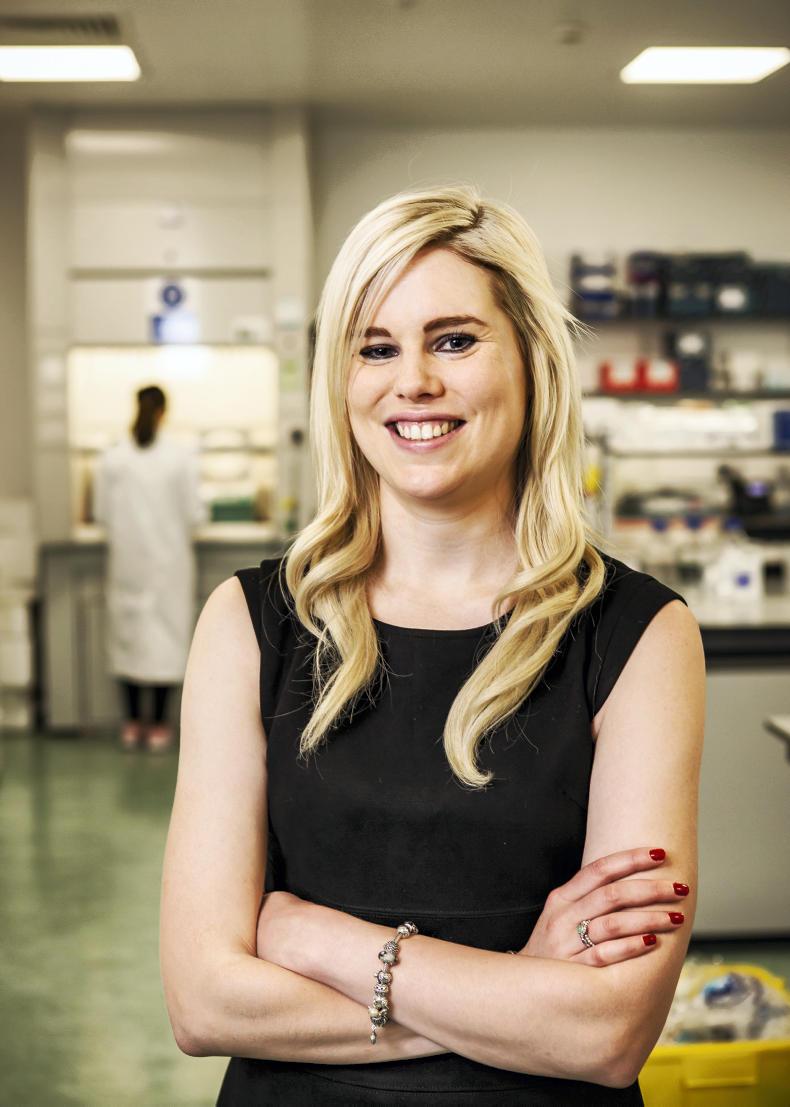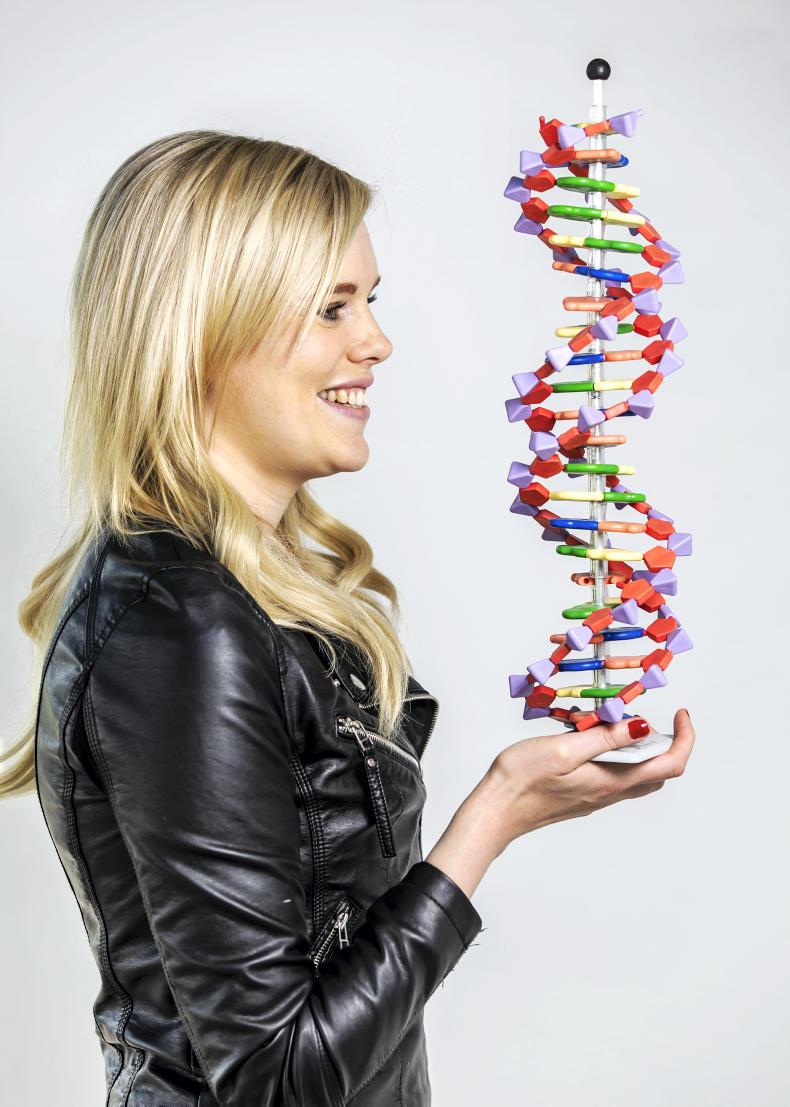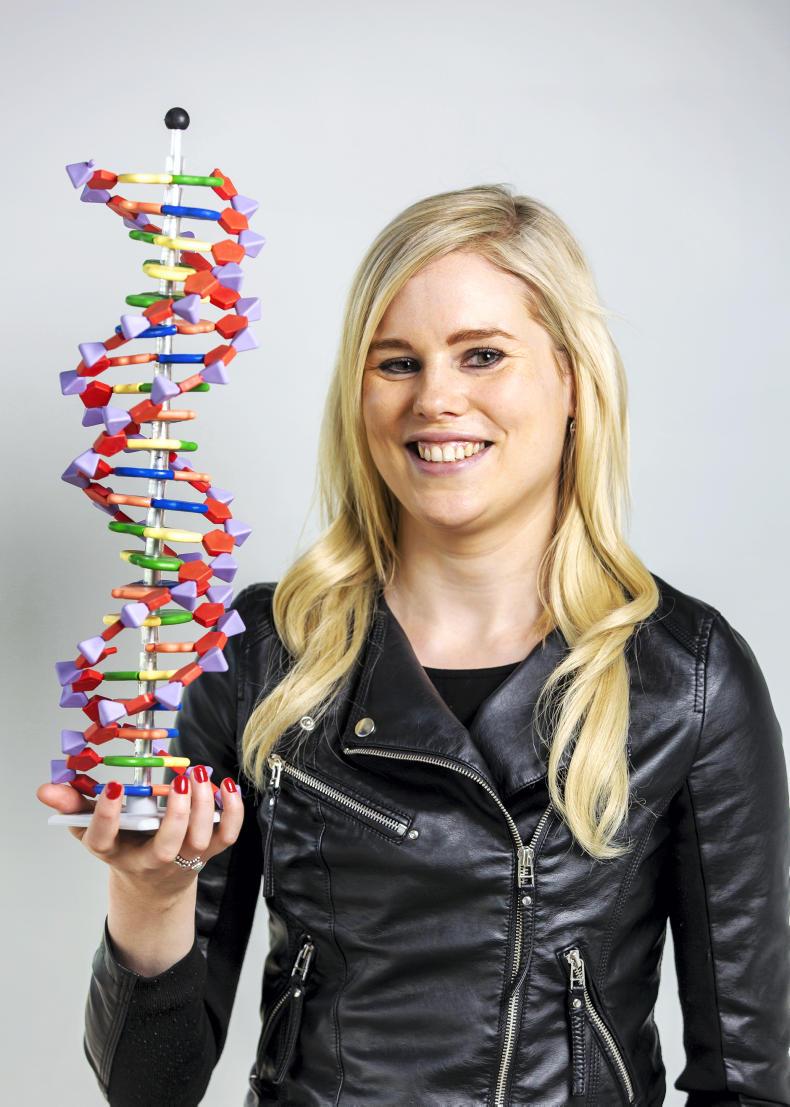I love the discovery of new things. I love finding out things that people would not have known before. It is a great feeling to know you have progressed science in your area.”
For Dr Dayle Johnston, education and Science, technology, engineering, and mathematics (STEM) has been a major part of her life. From beginning her education in Oxmantown National School Birr to a research PhD in Teagasc in Grange, she has passed through Trinity, Maynooth and UCD. Almost 22 years of her 30 years have been spent in education. For her, the perks of discovering new things and constantly learning makes it worth it.

For many like her, STEM has become an appealing career path over the last decade.
The challenge for Ireland, however, is to encourage more women into STEM jobs. Of the 120,000 people using STEM skills in their job, under 25% of them are women, according to the Central Statistics Office (CSO). This is also noted when it comes to third-level education, with a report finding that 40% of males are applying for STEM on their CAO form, compared to 19% of females.
This report – a UCD study entitled Understanding Gender Differences in STEM, published in March – also stated that females based their CAO choice on subjects they study in the Leaving Cert. This is one of the big reasons for the gender difference in STEM. While there is a relative balance of males and females studying science at second level, just 5% of girls study subjects such as engineering, construction, technology and graphic design.
Path into STEM
Dayle’s path to STEM came through a love for science in school. Her path in education began in Birr before boarding at Kilkenny College. An interest in science and a curiosity for nature saw the Offaly native choose the scientific route in college.
“I loved science in school. I studied two science subjects and had a brilliant science teacher. I enjoyed discovering new things. Growing up on a farm helped that. I had veterinary down as my first choice on the CAO but I didn’t get the points, so I decided to study science in Trinity.”
Dayle started in Trinity in 2007 studying general science before specialising in zoology in her third year of the course.

“Zoology was great but I would have preferred if there were more agricultural components to it. I realised when I did my PhD that I would have preferred the ag part of the course. I suppose it is because I grew up on a farm and I wanted to go further with it.”
She graduated from Trinity in 2011 before undertaking a professional diploma in education in Maynooth, with the view to becoming a teacher.
“I spent a year in Maynooth and decided against teaching as a career path. Similar to many new graduates, I didn’t know what I wanted to do. I really didn’t know what I was qualified to do or if there was a job out there for me. I was researching jobs at the time and eventually found an internship at Teagasc.”
Dayle was accepted onto the internship programme in Moorepark starting in October 2012.
“I loved the internship. Growing up on a farm I knew about the advisory component of Teagasc but I didn’t know that they did research. The internship is how I figured out what I wanted to do.
“While I was there I attended research talks that were given by the PHD students and they spoke about the opportunities in the PhD programmes. I remember thinking to myself, ‘I would love to do that’.
“I originally wanted to be a vet and I was always interested in animal health, particularly calves. I decided that if a PhD came up in any of these areas I would like to do it. Then one came up in the calf health and pneumonia and I managed to get into it.”
Having completed her internship in February, the Offaly native began her three-year PhD in March 2013.
The research

“Basically I was characterising calf health and immunity in two breeds of dairy calves, Holstein-Friesian and Jersey calves. I was also developing a novel diagnostic method (bacterial 16S rRNA gene amplicon sequencing) for the identification of bacteria causing pneumonia in calves”
Quite the mouthful.
In essence, her job was to analyse the DNA in post-mortem infected calf lung tissue samples and identify what bacteria were present.
Further study
There is no question that those going down Dayle’s career path must have an interest in their chosen topics, and also in research. After the three-year PhD concluded, Dayle was 27 and began a contract as a research officer in Teagasc Grange, examining molecular biomarkers of early pregnancy in dairy cows.
This research was funded by Science Foundation Ireland. Following on from this, she secured a position as a post-doctoral researcher again at Grange in January 2018 in calf health and genomics.

“The research studies that we are conducting may have an impact on every farmer in the country when they are concluded.
“We are looking into calf genetic responses to pneumonia. When it is finished, we are hoping that we can integrate the data into the national genomic breeding programme, so we can breed calves with greater resistance to pneumonia.”
This vital research is funded by DAFM, DAERA and the USDA as part of a Tri-Partite US-Ireland research and development (R&D) partnership grant.
The work and opportunities
“My work varies from day to day. Sometimes I am in the lab, sometimes I’m at the computer performing bioinformatics, sometimes I am taking samples off calves. You also have to devote a lot of time to writing and publishing research papers in international peer-reviewed journals, so it is busy. The hope for the future is to get a permanent job. That is the goal. I love the area of calf health so if I can stay in the area of agricultural research that would be great.
“I am very proud of what I have achieved in research thus far. I have discovered new things and have progressed science in my area. That is a great feeling”, she explained.
STEM and the agri-food industry
While research may not be for everyone, the variety and breadth of roles across STEM is huge and STEM skills are not just in demand in agriculture but across the wider economy Research posts, lab assistants, R&D roles, engineers and scientists are all required across the sector.
At this year’s Agri-Careers Expo, companies such as McHale, Class, Glanbia, Zoetis, Kerry Group and Kepak were looking for engineers at the event. Roles in R&D were offered in the highest number at the event with Teagasc leading the way followed by Glanbia and Zoetis also noting numerous opportunities for these jobs.
I love the discovery of new things. I love finding out things that people would not have known before. It is a great feeling to know you have progressed science in your area.”
For Dr Dayle Johnston, education and Science, technology, engineering, and mathematics (STEM) has been a major part of her life. From beginning her education in Oxmantown National School Birr to a research PhD in Teagasc in Grange, she has passed through Trinity, Maynooth and UCD. Almost 22 years of her 30 years have been spent in education. For her, the perks of discovering new things and constantly learning makes it worth it.

For many like her, STEM has become an appealing career path over the last decade.
The challenge for Ireland, however, is to encourage more women into STEM jobs. Of the 120,000 people using STEM skills in their job, under 25% of them are women, according to the Central Statistics Office (CSO). This is also noted when it comes to third-level education, with a report finding that 40% of males are applying for STEM on their CAO form, compared to 19% of females.
This report – a UCD study entitled Understanding Gender Differences in STEM, published in March – also stated that females based their CAO choice on subjects they study in the Leaving Cert. This is one of the big reasons for the gender difference in STEM. While there is a relative balance of males and females studying science at second level, just 5% of girls study subjects such as engineering, construction, technology and graphic design.
Path into STEM
Dayle’s path to STEM came through a love for science in school. Her path in education began in Birr before boarding at Kilkenny College. An interest in science and a curiosity for nature saw the Offaly native choose the scientific route in college.
“I loved science in school. I studied two science subjects and had a brilliant science teacher. I enjoyed discovering new things. Growing up on a farm helped that. I had veterinary down as my first choice on the CAO but I didn’t get the points, so I decided to study science in Trinity.”
Dayle started in Trinity in 2007 studying general science before specialising in zoology in her third year of the course.

“Zoology was great but I would have preferred if there were more agricultural components to it. I realised when I did my PhD that I would have preferred the ag part of the course. I suppose it is because I grew up on a farm and I wanted to go further with it.”
She graduated from Trinity in 2011 before undertaking a professional diploma in education in Maynooth, with the view to becoming a teacher.
“I spent a year in Maynooth and decided against teaching as a career path. Similar to many new graduates, I didn’t know what I wanted to do. I really didn’t know what I was qualified to do or if there was a job out there for me. I was researching jobs at the time and eventually found an internship at Teagasc.”
Dayle was accepted onto the internship programme in Moorepark starting in October 2012.
“I loved the internship. Growing up on a farm I knew about the advisory component of Teagasc but I didn’t know that they did research. The internship is how I figured out what I wanted to do.
“While I was there I attended research talks that were given by the PHD students and they spoke about the opportunities in the PhD programmes. I remember thinking to myself, ‘I would love to do that’.
“I originally wanted to be a vet and I was always interested in animal health, particularly calves. I decided that if a PhD came up in any of these areas I would like to do it. Then one came up in the calf health and pneumonia and I managed to get into it.”
Having completed her internship in February, the Offaly native began her three-year PhD in March 2013.
The research

“Basically I was characterising calf health and immunity in two breeds of dairy calves, Holstein-Friesian and Jersey calves. I was also developing a novel diagnostic method (bacterial 16S rRNA gene amplicon sequencing) for the identification of bacteria causing pneumonia in calves”
Quite the mouthful.
In essence, her job was to analyse the DNA in post-mortem infected calf lung tissue samples and identify what bacteria were present.
Further study
There is no question that those going down Dayle’s career path must have an interest in their chosen topics, and also in research. After the three-year PhD concluded, Dayle was 27 and began a contract as a research officer in Teagasc Grange, examining molecular biomarkers of early pregnancy in dairy cows.
This research was funded by Science Foundation Ireland. Following on from this, she secured a position as a post-doctoral researcher again at Grange in January 2018 in calf health and genomics.

“The research studies that we are conducting may have an impact on every farmer in the country when they are concluded.
“We are looking into calf genetic responses to pneumonia. When it is finished, we are hoping that we can integrate the data into the national genomic breeding programme, so we can breed calves with greater resistance to pneumonia.”
This vital research is funded by DAFM, DAERA and the USDA as part of a Tri-Partite US-Ireland research and development (R&D) partnership grant.
The work and opportunities
“My work varies from day to day. Sometimes I am in the lab, sometimes I’m at the computer performing bioinformatics, sometimes I am taking samples off calves. You also have to devote a lot of time to writing and publishing research papers in international peer-reviewed journals, so it is busy. The hope for the future is to get a permanent job. That is the goal. I love the area of calf health so if I can stay in the area of agricultural research that would be great.
“I am very proud of what I have achieved in research thus far. I have discovered new things and have progressed science in my area. That is a great feeling”, she explained.
STEM and the agri-food industry
While research may not be for everyone, the variety and breadth of roles across STEM is huge and STEM skills are not just in demand in agriculture but across the wider economy Research posts, lab assistants, R&D roles, engineers and scientists are all required across the sector.
At this year’s Agri-Careers Expo, companies such as McHale, Class, Glanbia, Zoetis, Kerry Group and Kepak were looking for engineers at the event. Roles in R&D were offered in the highest number at the event with Teagasc leading the way followed by Glanbia and Zoetis also noting numerous opportunities for these jobs.








SHARING OPTIONS